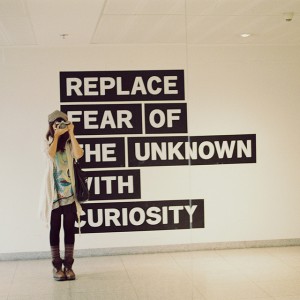
This is me. Hello world!
Today, I want to do something a little different. With this blog, I want to share all the advice I’ve picked up over the past few years on how to combat anxiety. But I also want to give you a personal look into the life of a fellow anxiety sufferer so you know that you’re not alone. In this post, I will walk you through a brief overview of the progression of my own anxiety and what has helped me get better.
I’ve been anxious most of my life. It started as a young child, when I was a definite social phobic in the making. I used to cry very easily and I found it difficult to speak my mind. As I grew up, I learned to avoid the things that made me feel nervous or uncomfortable (like being assertive, talking on the phone, or joining new activities). Through my teenage years, I went through spells of bullying (as most people do) which served to strengthen my burgeoning feelings of social ostracism. I grew painfully aware of how socially awkward I can be, and slowly started to fear meeting new people and being in new situations.
Fastforward a couple years. I started college (or university, as we say here in Canada). I made lots of awesome friends. I met lots of cool new people. I tried new things, learned new things, saw new things. My anxiety sat on the back burner as I forced myself to do the things that made me anxious. It seemed for awhile that by ignoring my anxiety, I could escape it. I was wrong.
I started volunteering in a lab the winter term of my first year. It was a psychology lab with rats. On my first day in the lab, my hands were shaking so badly that I couldn’t even pick one of the rats up out of its cage. I played it off as a latent fear of rats, but deep down I knew it was the social anxiety resurfacing. I am afraid of performing tasks in front of other, much more experienced people. I thought the fear would go away, but every time I went back to the lab, I was just as anxious as that first day. That was when I first realized that anxiety was going to be a problem for me.
The year 2011 was a particularly bad year for me. I was going through some major life changes and my anxiety was resurfacing with a vengeance. I barely made it through the winter term, and the subsequent summer was a rough one. I struggled with depression and anxiety. It was that summer when I finally reached out and started seeing a therapist.
I went through CBT (cognitive behavioural therapy), the prescribed therapy of choice, which was incredibly helpful in overcoming my depression. I learned a lot of new ways of thinking about my mental health problems. It seemed like I had made a major improvement in my life, and I thought I’d “cured” my mental illness. Unfortunately, I was wrong once again.
Last Christmas I had my first panic attack. Luckily for me, I’d read lots about panic attacks while going through CBT, so I knew what it was right away. That didn’t matter. It was the most terrified I’ve ever been. It started early one morning while I was having a cup of coffee (I used to be quite the caffeine hound). I noticed I felt a little “off”, almost like I hadn’t eaten in awhile. I shrugged it off for the time being and headed out to Walmart with my parents. As soon as I stepped into the store, I knew something was wrong. I felt immediately uneasy, like something really bad was about to happen. My vision narrowed a bit; I felt suddenly unable to focus on anything but myself. My heart started racing, my breathing became labored, and my body went through rapid hot and cold flashes. I ran out of that store like a bat out of hell, tears spraying out my eyes (I cry every time I have a panic attack – you’d think it would get easier, right?).
Since that first panic attack, I’ve been constantly worried about having another one. And I have – several times. It still amazes me how my anxiety levels can change so dramatically, constantly going up and down, but the panic attacks are always the same. Each one is as terrifying as the last.
The panic was held at bay for most of the past year. I was anxious all through 2012, but I managed to get by. This past semester, I had started my honors thesis and was working a part-time job, all while juggling a regular course-load. Some weeks were harder than others, but on average I was putting in about 50-60 hours a week between being in the lab, being at work, attending classes (which I do quite infrequently), and studying (which usually means catching up). I wasn’t the busiest person in the world, but I learned quickly that my mind doesn’t do so well when it’s constantly forced to be on the go. And so, I snapped. Finals hit, and I just couldn’t handle my responsibilities anymore. I started having nightly panic attacks. It got harder and harder to just get out of bed in the morning. I started missing work, blowing off lab meetings, skipping classes that I knew were mandatory. In November, a psychiatrist slapped the official diagnosis of panic disorder on my forehead. And here we are.
I mentioned in my first post that I’d taken this semester off to relax and recharge (and hopefully become less anxious). Well, I have made some progress. I got into a loop of agoraphobia in my first few weeks here at home (meaning I was terrified of leaving the house), but I’ve slowly overcome it. As hard as it is, the most effective way to overcome your anxiety is simply to face it. Anxious brains have learned that certain situations demand a fight-or-flight response, and it’s your job to teach your brain that it’s wrong. Each day, I have to step out of the house and remind my brain that the world isn’t as dangerous as it may seem.
If you’re curious, here are some things that have worked for me:
- Accepting my feelings and talking about them more often
- Explaining to other people what it means for me to be anxious and how they can help
- Lots of exercise
- Meditation and mindfulness (more on that later)
- Deep breathing (I mentioned breathing in a previous post)
- Sleeping more regularly (another future topic)
- And of course, exposure therapy
There is no one recipe for overcoming anxiety, or any other mental illness for that matter. You will have to take the time to see what works for you and what doesn’t. You may relate with everything I’m saying, or nothing at all. Unlike most physical illnesses, mental illnesses are quite different from person to person. We all have our own struggles.
What is your story? If you’re up to it, post your own anxiety story. If you’d prefer, you could comment with anything you’ve found helpful on your own path to recovery.




